Why Oil Prices affect Electricity
As most traditional backup and temporary generators are run on diesel (a product derived from crude oil), when oil prices rise, there is a knock-on effect on diesel, increasing the operating costs of generators. At even a few more pence per litre, that could increase the cost of running a 200 kVA generator for one week by almost GBP300.
At some point, many of us have been told off for leaving the lights on in an unused room and heard the phrase “It’s like Blackpool Illuminations in here”, referring to the dazzling light show in the North of England. In 1879, the illuminations were a new wonder; electricity was exciting and relatively cheap compared to gas lighting. Fast forward to today, and while we still love the spectacle of lights, keeping the lights on, especially in off-grid situations, can come with a hefty price tag and for our customers, temporary power solutions do far more than put on a light show – they keep entire sites powered, from critical equipment in hospitals, to essential services such as powering classrooms.
In this blog, we’ll explore how oil prices impact electricity and what can be done to mitigate the fluctuations in the oil market.
Why have diesel prices been steadily rising?
Global oil supply disruptions, such as production cuts and demand surges (for example, during winter months and post-COVID recovery), can push oil prices up. Diesel is also harder to refine than petrol, and with several older refineries shutting down permanently while others are prioritising jet fuel or petrol, this reduces the supply of diesel. Lower supply means a premium price. According to Market Growth Reports, diesel prices fluctuated by over 21% globally in 2023, a direct response to the fluctuating price of oil.
Diesel powers freight, agriculture, backup power and construction – the construction sector alone rented over 780,000 diesel generators worldwide in 2023 – leading to a high global demand. These sectors rely on diesel power and can’t easily shift to electric for a multitude of reasons: long-haul trucks and HGVs need significant power and range – far more than most current electrical vehicle batteries can provide. Additionally, in rough, muddy and often weather-exposed construction sites – diesel equipment is durable and proven.
Environmental regulations also lead to increased diesel costs, as stricter emissions control measures mean more expensive production methods and more stringent compliance, resulting in increased demand for Stage V generators as they are the latest emissions standard for non-road mobile machinery (NRMM), setting strict limits on particulate matter and nitrogen oxides.
How do rising diesel prices affect temporary power sites and generators?
When diesel prices increase, off-grid and temporary power sites – such as construction sites, hospitals with backup generators and festivals – the impact of cost increases will be felt immediately as diesel may be their primary energy source.
With traditional diesel generators, fuel can account for up to 60-90% of running costs once the set is on site. Where fuel usage can be minimised, this will lead to savings for the business. This also explains the increased demand for hybrid systems (combining diesel with battery storage). The European Union has mandated that over the next decade, a growing proportion of materials in EV batteries must be recycled, leading Jaguar Land Rover to develop a mobile energy storage unit utilising used batteries from plug-in hybrid Range Rover models.
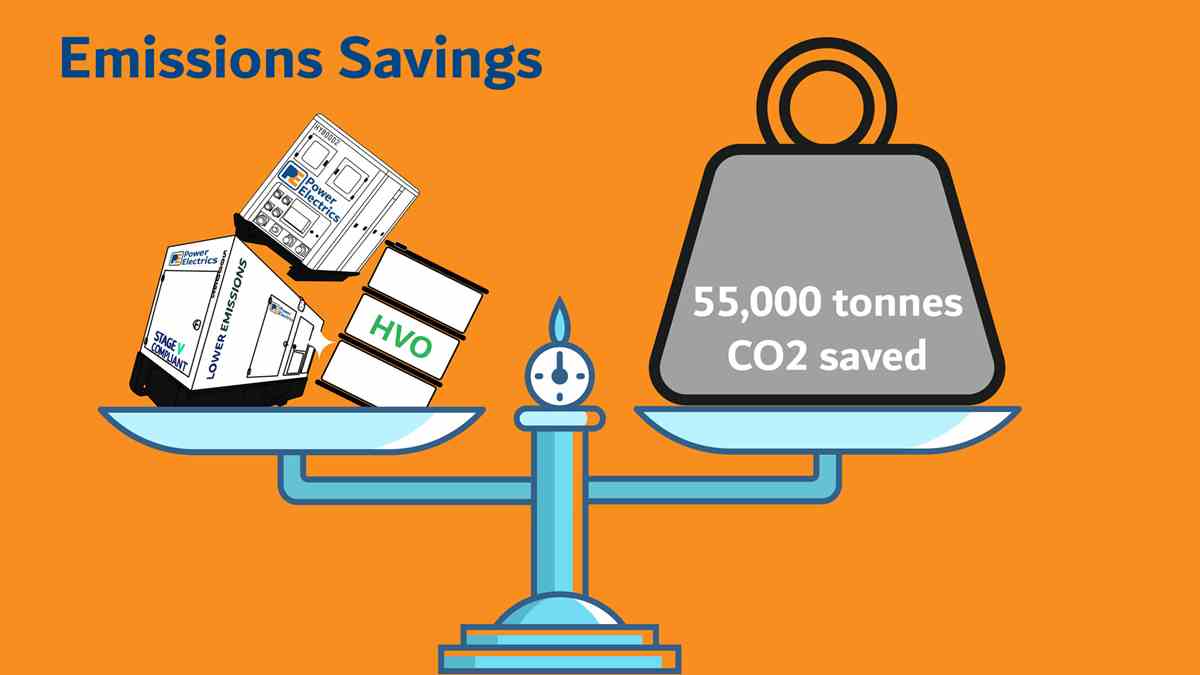
How Power Electrics can Help
As fuel prices fluctuate, we continue to invest in a range of smart solutions to ensure that we are best placed to help our customers reduce dependency on diesel, resulting in cost savings. With a fleet of over 200 Hybrid units and a recent GBP2 million investment in new BESS units, we are at the forefront of reducing fuel usage – both as a business and for our customers. In 2024 alone, through the use of BES units, Stage V Generators and HVO fuel – we helped our customers cut their CO2 emissions by over 55,298 tonnes (equivalent to 467 plane flights around the earth!).
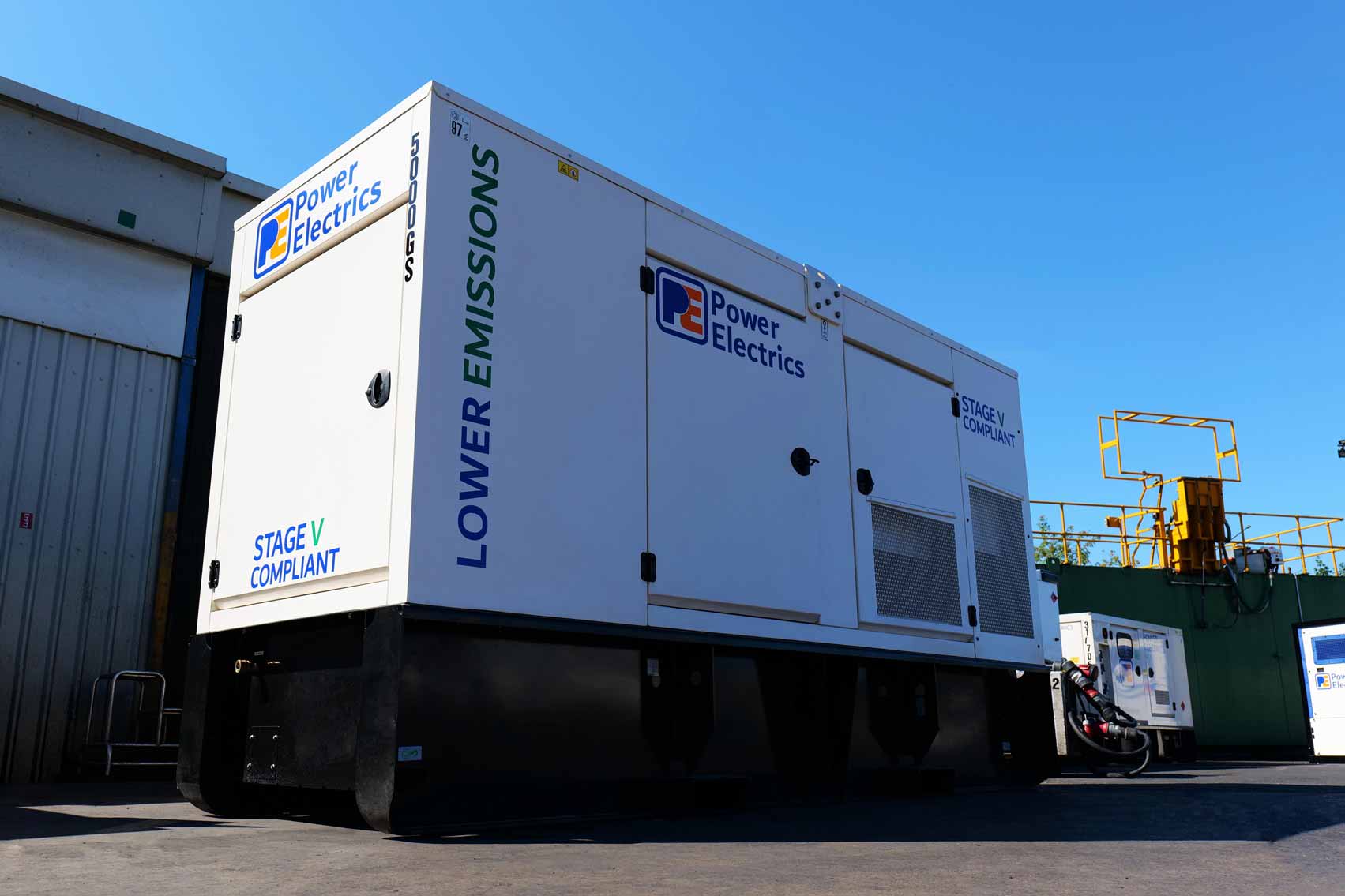
Stage V Generators
Stage V is the fifth iteration of the emission standard as part of the NRMM legislation. The legislation sets the criteria for levels of carbon monoxide, hydrocarbons, oxides of nitrogen and particulate matter produced for diesel engines. Stage V generators deliver up to 5-10% better fuel efficiency than older models. A 200 kVA generator running 60 hours a week could save around 120 litres of diesel weekly, or GBP171/week at today’s average diesel price of GBP1.425/L which is over GBP8,900/year.
When paired with a Battery Energy Storage System (BESS), fuel savings can increase dramatically. By allowing the generator to run only when needed and at optimal load, a BESS can reduce generator runtime by up to 50%. In this scenario, diesel savings could exceed 300 litres per week, equating to more than GBP21,000 annually, while also cutting emissions, reducing noise, and extending generator service intervals.
BESS Units
BESS units are ideal for supplying power during low-demand periods, meaning the generator doesn’t need to run constantly. In some setups, the battery can be charged using grid power (if available) when rates are low and use the stored energy later – cutting fuel use entirely during those periods.
Hybrid set ups are successfully utilised around the world to reduce reliance on diesel. From powering sites in the UK, as shown in our recent game-changing power solution case study – combining a modest grid connection with a BESS unit lead to the site saving over 62,524 litres of diesel. This is a cost saving of approximately GBP89,099 in fuel costs (based on July 2025 average diesel prices). Then jetting across (or taking a combination of electric trains / hybrid ferries!) to the other side of the world, in the rural Outback of Australia, BESS unit hybrid set-ups have been deployed successfully to help remote, Aboriginal communities utilise uninterrupted electricity, keeping food cold and having better access to food and entertainment.
According to the Deloitte Research Centre for Energy & Industrials, the need for energy storage is becoming critical, with electricity demand shifts arising from evolving customer behaviour and the growth of energy storage on the grid expected to reach 225-460 GW by 2050.
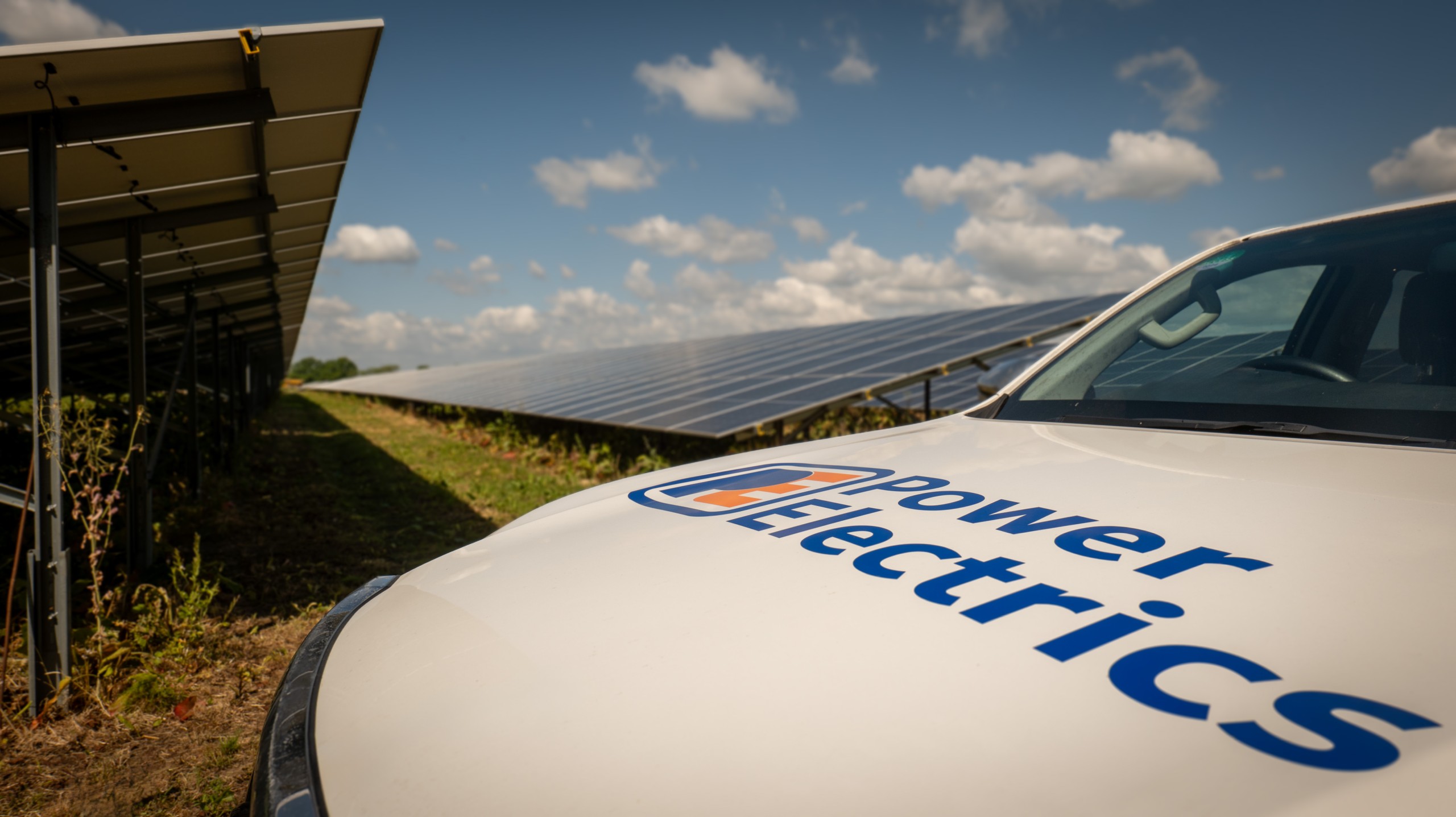
BESS units have also been integral for our project supporting the construction of a 49.9 MW solar farm in the Southeast of England. We have been based at the site since 2024, supporting the build.
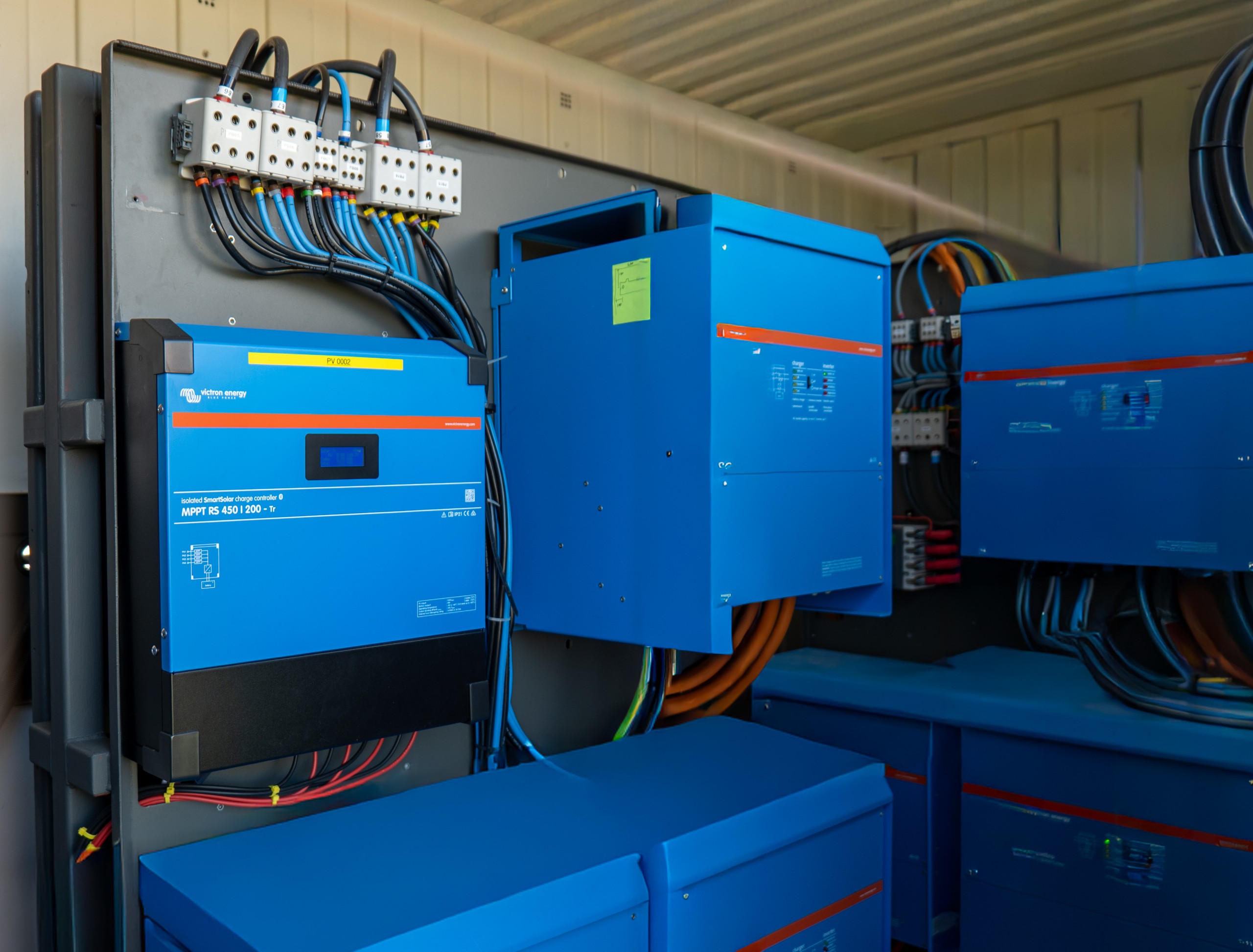
The farm is expected to begin generating power in mid-2026, with a plan to supply enough clean energy to power 15,120 households, offsetting 16,550 tonnes of CO2 annually. Once the farm is up and running, diesel usage will be reduced dramatically.
Smart Distribution and Load Optimisation
To avoid using unnecessary diesel, when planning any project, our experienced technical team will use their expertise to right-size power solutions – avoiding over-specified generators that will waste fuel at low loads. The team will also segment site loads, using multiple generators or hybrid systems to power zones independently and reduce idle time. Additionally, the use of our bespoke Power Electrics Telemetry (PET) system, allows us to monitor load profiles in real time – ensuring fuel usage can be adjusted proactively during the project.
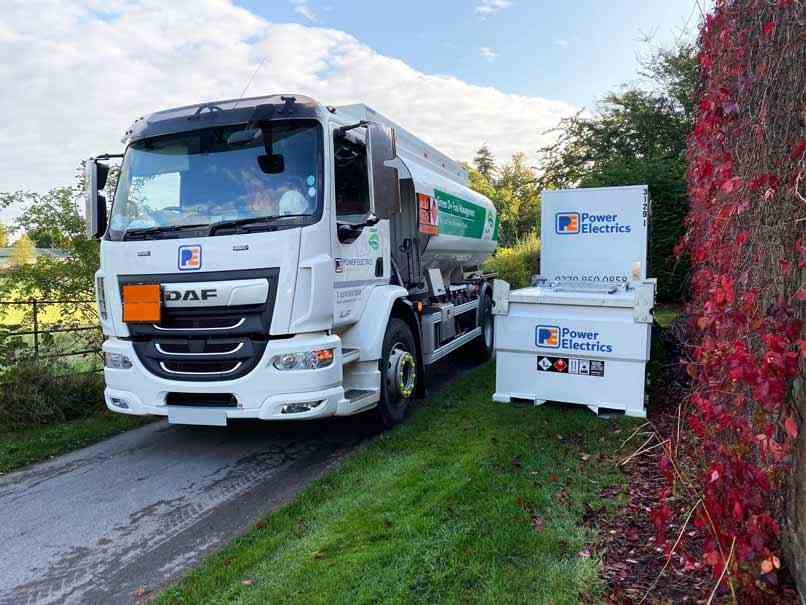
Fuel Management Services
With the volatility of diesel prices, optimising delivery and usage is essential for minimising costs. We offer a complete fuel management service including:
- Scheduled fuel deliveries – timed to reduce disruption
- Fuel usage reporting – helping track consumption
- On-site bunded tanks – reducing spill risks and improving fuel security
- HVO offering – for compatible generators
Through a multi-pronged, bespoke approach, Power Electrics will work with you to understand your power requirements and then advise and facilitate the best course of action to power your project while also reducing fuel consumption successfully.
What Does the Future Look Like for Oil Prices?
As global oil markets remain sensitive to geopolitical events, supply chain disruptions and economic shifts, diesel prices are likely to remain unpredictable in the years ahead. At the same time, environmental regulations are also driving change, with the enforcement of tighter air quality standards as seen in the implementation of low-emission zones across the UK. These pressures mean that, regardless of fuel price, businesses must increasingly consider greener alternatives. Fortunately, modern solutions like Stage V generators and hybrid BESS setups not only meet regulatory demands but also deliver long-term savings through lower fuel usage, reduced emissions, and improved operational efficiency.
Riyadh to Richmond
When even the world’s most oil-dependent economies are investing heavily in clean energy, it’s a clear signal that the global future lies in greener, more sustainable power solutions. 3,174 miles from Riyadh, from the grand Georgian townhouses in Richmond to the serene, winding riverbanks of Ross-on-Wye, businesses across the UK are also reducing their reliance on oil in order to meet the UK target of net-zero emissions by 2050.
Reflecting on the fluctuating oil price landscape, our vision for the future is to ensure both adherence to compliance and cost savings for the customer. Internally, our Journey to Green roadmap ensures we are constantly testing new technologies and fresh approaches to providing more environmentally friendly temporary power. We are at the forefront of the diesel reduction revolution: continuing to invest in both Stage V and BESS units, ensuring a future-proofed fleet that is ready to meet increasing demand for reduced diesel emissions while providing reliable power for projects across the UK.
If you would like to find out more about our sustainable power offerings, reach out to us on the link below to find out more.









